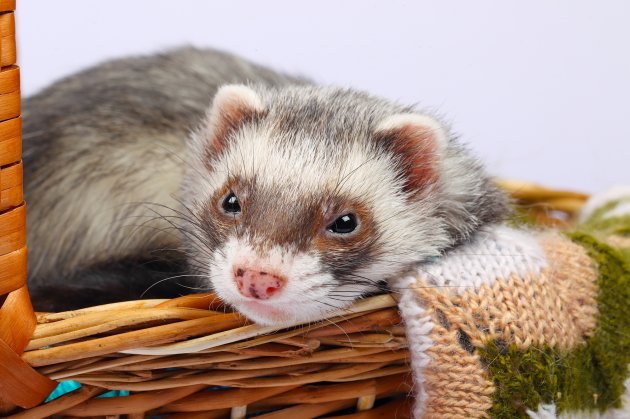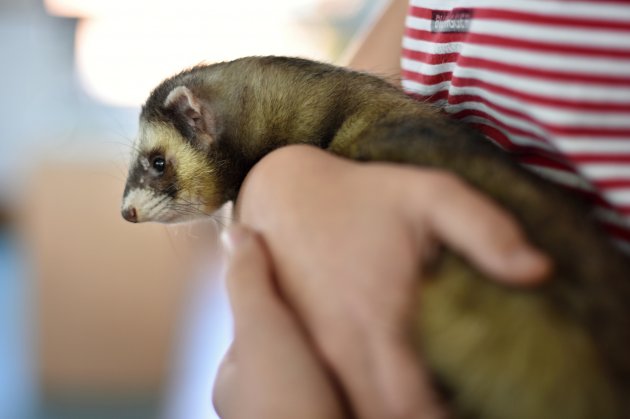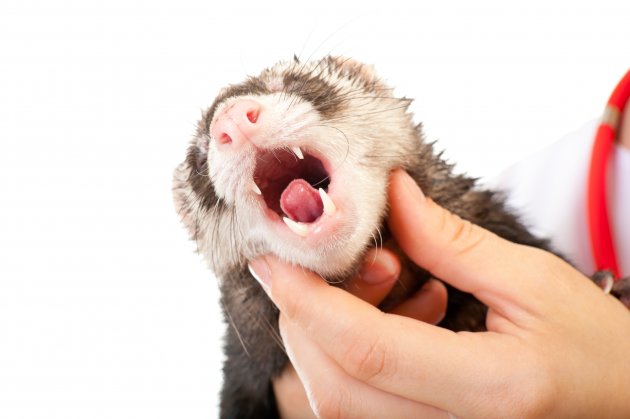Congratulations! As the owner (or wannabe) of a ferret, you are privy to the delightful, characterful furry-friendliness of these often misunderstood animals. They are cute and curious, clever and companionable, sociable but silent, and so for the right person ferrets make an ideal pet.
But just as more traditional pets can become ill, so do ferrets. And while much is now known about ferret health, reaching a diagnosis and treatment can be tricky. To help keep your fur-friend at their playful best, be aware of these nine common ferret health problems.

#1: Anaemia in Female Ferrets
An unmated female ferret stays in heat for long periods of time. These high levels of oestrogen in the blood suppress the bone marrow’s ability to produce red blood cells. Untreated, the female can become dangerously anaemic (lacking in red blood cells.)
Symptoms of this in an entire female ferret are:
- Extreme lack of energy
- Pale pink or white gums
- Breathlessness
- Poor appetite
- Excessive sleeping
If the problem is spotted in time, treatment includes a life-saving blood transfusion. However, this condition can be prevented simply by spaying the female ferret at a young age.
#2: Distemper
Most people are familiar with the concept of distemper in dogs, but sadly the same virus also causes serious disease in ferrets. The incubation period is around 7 – 10 days and the symptoms include:
- Fever
- A thick sticky discharge from the nose and eyes
- Sneezing and coughing
- Sickness and/ or diarrhoea
- Crustiness affecting footpads
- Seizures
Unfortunately, most infected ferrets become very ill almost overnight and die suddenly. Indeed, there is no cure, and once sick their best hope is intravenous fluids and antiviral drugs.
Prevention is key and there is an FDA approved vaccine for the prevention of distemper in ferrets. Vaccination should be given at 8, 10, and 12 weeks of age, and then yearly.

#3: Cushing’s Disease
Cushing’s disease in the ferret refers to an over-production of several naturally occurring hormones. In ferrets, this is due to overactive adrenal glands which then become cancerous. And unlike in dogs, where Cushing’s Disease results in an overproduction of corticosteroid, in ferrets the adrenal glands pump out high levels of reproductive hormones.
The symptoms include:
- Hair loss over the body, often in a symmetrical pattern
- Some cases may be itchy
- An enlarged vulva in females
- Straining to urinate in males (due to prostate enlargement)
This is a confusing condition because the symptoms overlap with those of persistent oestrous in females. However, in a spayed female with an enlarged vulva and bald patches, Cushing’s Disease is highly likely.
Treatment involves the use of implants that counteract the excess production of the sex hormone. Theoretically, surgery is possible to remove the enlarged adrenal glands, but this is technically very demanding and carries a high complication rate.
#4: Obesity
The insatiable curiosity of a ferrety-friend is only matched by their insatiable appetite. They take great delight in sampling human snacks and makes them rewarding pets to give treats to. However, when treating your pet always remember their relative small size compared to a person, and that being overweight is bad for their health.
#5: Pancreatic Cancer
Unfortunately, ferrets are prone to a form of pancreatic cancer which leads to on over-production of insulin. The latter hormone controls blood sugar level and when too much is present the ferret is in danger of lapsing in to a coma.
Signs include:
- Weakness
- Paralysis of the back legs
- Excessive teeth grinding
- Heavy drooling
- Loss of consciousness
- Seizures
Treatment options are limited. Medical therapy includes giving corticosteroids such as prednisolone, to raise blood glucose levels. If there is a single tumour in the pancreas, surgical removal may be a possibility. However, it is common to have multiple small tumours scattered through this gland which means surgery won’t help.

#6: Bowel Blockages
Ferrets are mischievous fellows that love to investigate everything with their mouth. The problem being whatever goes into their mouth is likely to be swallowed, whether it’s digestible or not.
Objects such as chewed up plastic toy or even cloth from a sock, can easily lodge in the bowel and cause a blockage. Symptoms of this include:
- Lack of appetite
- Vomiting
- Depression
- Lack of energy
- Collapse
It is important that the blockage is identified early, before permanent damage to the gut occurs. Surgical removal of the foreign body, gives the ferret a good chance of recovery. But when the obstruction goes undetected, serious complications, including death, are likely.
#7: Heart Disease
There are two forms of heart disease that are relatively common in ferrets. The first affects the muscle of the heart wall and is called ‘dilated cardiomyopathy’. The second is heartworm disease.
Symptoms include:
- Rapid shallow breathing
- Weakness
- Coughing
- Poor appetite
- Weight loss
- Lack of energy
- Paralysis of the back legs
Always feed a good quality diet that is rich in taurine. The latter is essential to heart health, and in cats a lack of taurine causes dilated cardiomyopathy. It is unclear if the same link is present in ferrets but it seems sensible to not to take the risk.
Products are available to protect ferrets against heartworm, but it is important they are applied regularly.
#8: Dental Disease
Just as too many sweet means tooth decay and a trip to the dentist for us, the same is true for ferrets.
Avoid dental disease by feeding a well-balanced ferret diet and avoid giving sugary snacks.

#9: Lymphosarcoma
Lastly is a form of cancer that affects the immune system called lymphosarcoma. Whilst this condition is treatable in cats and dogs, in ferrets the drugs used do more harm than good.
Symptoms of lymphosarcoma include:
- Enlarged lymph nodes: The are often symmetrical on the left and right of the body, and obviously swollen
- Weight loss
- Poor appetite
- Laboured breathing
Whilst there is no treatment for lymphosarcoma in ferrets, it’s fair to note that not all lymph node enlargement is due to cancer. If your ferret has a swollen gland, always get them checked by a vet.
So there we have the nine most common ferret health problems. If your ferret is unwell, always take them to see a vet. A condition caught early has a better chance of successful treatment and getting your ferret back to their characterful best.